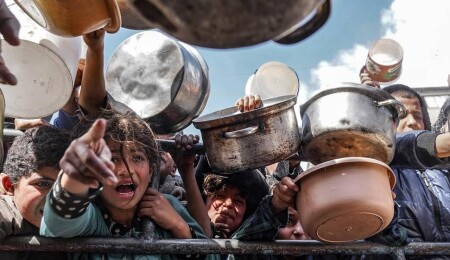Gazan Family digs Through Trash for Food as Desperation Grows

Amid swarming flies and the ruins of Gaza City, a woman and her daughter scavenged through garbage bags at the base of a destroyed building, salvaging meager remnants of food—bits of rice, scraps of bread, and traces of white cheese.

Islam Abu Taeima picked soggy bits from a piece of bread and put the dry part in her sack. She will take what she found back to the school where she and hundreds of other families live, boil it and serve it to her five children, she said.
"We’re dying of hunger,” she said. "If we don’t eat, we’ll die.”
Her rummaging for food is a new sign of the depths of desperation being reached in Gaza, where the population of some 2.3 million has been pushed toward famine by Israel’s nearly three-month blockade. The entry of a small amount of aid in the past week has done almost nothing to ease the situation.
Before the war, it was rare to see anyone searching through garbage for anything, despite the widespread poverty in the Gaza Strip.
Since Israel launched its genocidal war, decimating the strip after Hamas’ Oct. 7, 2023, incursion, it has been common to see children searching through growing, stinking piles of uncollected garbage for wood or plastic to burn in their family's cooking fire or for anything worth selling – but not for food. For food, they might search through the rubble of damaged buildings, hoping for abandoned canned goods.
But Abu Taeima says she has no options left. She and her 9-year-old daughter Waed wander around Gaza City, looking for leftovers discarded in the trash.
"This is our life day to day,” she said. "If we don’t gather anything, then we don’t eat."
It's still not common, but now people picking food from trash are occasionally seen. Some come out after dark because of the shame.
"I feel sorry for myself because I’m educated and despite that I’m eating from the trash," said Abu Taeima, who has a bachelor’s degree in English from Al-Quds Open University in Gaza.
Her family struggled to get by even before the war, she said. Abu Taeima has worked for a short time in the past as a secretary for UNRWA, the main U.N. agency for Palestinian refugees and the biggest employer in Gaza.
She also worked as a reader for blind people. Her husband worked briefly as a security guard for UNRWA. He was wounded in the 2021 war between Hamas and Israel and has been unable to work since.
Israel cut off all food, medicine and other supplies to Gaza on March 2. It said the blockade and its subsequent resumption of the war aimed to pressure Hamas to release the hostages it still holds. But warnings of famine have stoked international criticism of Israel.
It allowed several hundred trucks into Gaza last week. But much of it hasn’t reached the population, either aid trucks were looted or because of Israeli military restrictions on aid workers’ movements, especially in northern Gaza, according to the U.N. Aid groups say the amount of supplies allowed in is nowhere near enough to meet mounting needs.
Abu Taeima and her family fled their home in the Shati refugee camp on the northern side of Gaza City in November 2023. At the time, she and one of her children were wounded in a tank shelling, she said.
They first headed to the strip’s southernmost city of Rafah where they sheltered in a tent for five months. They then moved to the central town of Deir al-Balah a year ago when Israel first invaded Rafah.
During a two-month cease-fire that began in January, they went back to Shati, but their landlord refused to let them back into their apartment because they couldn’t pay rent, she said.
Several schools-turned-shelters in Gaza City at first refused to receive them because they were designated for people who had fled towns in northern Gaza. Only when she threatened to set herself and her family on fire did one school give them a space, she said.
Abu Taeima said her family can’t afford anything in the market, where prices have skyrocketed for the little food that remains on sale.
She said she has tried going to charity kitchens, but every time they run out of food before she gets any. Such kitchens, producing free meals, have become the last source of food for many in Gaza, and giant crowds flood them every day, pushing and shoving to get a meal.
"People are struggling, and no one is going to be generous with you,” she said. "So collecting from the trash is better.”
The risk of catching a disease isn't at the top of her list of worries.
"Starvation is the biggest disease," she said.
Source: Daily Sabah


Comments
Attention!
Sending all kinds of financial, legal, criminal, administrative responsibility content arising from illegal, threatening, disturbing, insulting and abusive, humiliating, humiliating, vulgar, obscene, immoral, damaging personal rights or similar content. It belongs to the Member / Members.